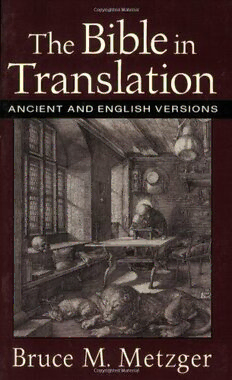
Bible in Translation, The: Ancient and English Versions PDF
109 Pages·2001·1.115 MB·English
Most books are stored in the elastic cloud where traffic is expensive. For this reason, we have a limit on daily download.
Preview Bible in Translation, The: Ancient and English Versions
Description:
"The Bible in Translation" is a survey of the history and variety of Bible translations by the late Bruce M. Metzger, who was himself an eminent translator and New Testament scholar, having served on three translation committees, including as chairman of the NRSV committee. The book is divided into two parts: Ancient Versions and English Versions. "Ancient Versions" follows the Bible (Jewish and Christian) in translation from the Septuagint through the Middle Ages, with mostly brief explanations of translations into Greek, Aramaic, Latin, Coptic, Visigothic, and more. The section on English Versions is longer and picks up the translation trail in 1382, with the Wycliffite Bible.Metzger covers about 45 English translations in all, 24 of which were produced since World War II. This book was published in 2001, so it stops there. This is not a comprehensive list of English translations, but Metzger has chosen those that were major undertakings or are important in retrospect, as well as translations that became particularly popular. The amount of information presented varies by translation, but generally Metzger explains the circumstances under which the translation took place, who the translators were, characteristics of the translation, its purpose, its printing history, strengths, and shortcomings, with examples from the text.The English Bibles begin with the pre-KJV versions, from the Wycliffite (1382) to the Douay-Rheims (1610), before moving on to the King James Version (1611), translations between the KJV and the RV, the British Revised Version (1885) and ASV (1901), and the modern speech versions of the early 20th century. Major versions of the second half of the 20th century (RSV, JB, NAB, NEB, NIV) are addressed at greater length in their own chapters. Both Protestant and Roman Catholic Bibles are covered. There are also chapters on Jewish Bibles, the revised versions of the last couple decades of the 20th century, easy-to-read versions, and paraphrases.Judging from his writing, I would guess that Bruce Metzger was mainline Protestant. That puts him about in the middle of the road, which is probably a good place from which to critique translations. He critiques with a light touch and is always sympathetic to what the translators were trying to do. He uses the traditional abbreviations for translations somewhat unevenly and often without introducing them (as I have also done). I would have liked more consistency there, and a list of translations with abbreviations, dates, and type of translation in an appendix would have been helpful. But "The Bible in Translation" is an easy-to-digest survey for laypeople that will be helpful in choosing a translation(s), whether for scholarly or religious purposes.
See more
The list of books you might like
Most books are stored in the elastic cloud where traffic is expensive. For this reason, we have a limit on daily download.
